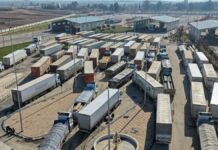
President Donald Trump’s decision to lift longstanding US sanctions on Syria has triggered a wave of reactions across the Middle East and beyond, with regional leaders and international organizations largely welcoming the move as a chance to restore stability and rebuild after over a decade of war.
The announcement, made during Trump’s speech at the Saudi-US Investment Forum on May 13, signals a seismic shift in American policy. “It’s time to give Syria a chance,” Trump said. “Syria has witnessed many years of misery and suffering, and today there is a new government that we hope will succeed in achieving stability and ending the crises.”
Trump’s remarks refer to Syria’s transitional administration under President Ahmad al-Sharaa, who took power following the ouster of Bashar al-Assad in December. US sanctions, first imposed in 2011, had targeted Assad, his allies, and state institutions, with sweeping effects on the Syrian economy and civilian population.
The US State Department emphasized that the decision was driven by humanitarian and regional security considerations. “We want to see peace and prosperity in Syria,” said Deputy Spokesperson Tommy Piggott. “This is about enabling a region of long-term stability.”
An “Arab Axis” of Syrian Support
The response from Arab states has been largely supportive. Qatar, Kuwait, Jordan, Lebanon, Bahrain, and Libya each issued statements backing the decision and commending Saudi Arabia’s diplomatic efforts, particularly those of Crown Prince Muhammad bin Salman (MBS). Iraq’s Ministry of Foreign Affairs called the move a “potentially pivotal step” in ending Syria’s humanitarian crisis and reaffirmed the need for Arab cooperation.
Jordanian spokesman Sufayn Qudah said the lifting of sanctions “opens new horizons for economic cooperation,” while Libya’s Foreign Ministry described it as a “glimmer of hope” for millions of Syrians. Lebanon’s Prime Minister Nawaf Salam added the move “will have positive repercussions for Lebanon and the region.”
The United Nations also voiced support. UN Special Envoy for Syria Geir Pedersen called the announcement a “crucial step” in restoring services and stimulating economic recovery. Secretary-General Spokesperson Stéphane Dujarric said sanctions relief was essential to “enable reconstruction and help the people recover.” Mazloum Abdi, commander of the US-backed Syrian Democratic Forces, said the move could help stabilize the country and build a better future.
Israeli Objections
Not all reactions were unequivocally positive. US Senator Lindsey Graham voiced concern over Syria’s new leadership emerging through armed struggle and said he plans to consult with Israeli allies. Reports indicate that Israeli Prime Minister Benjamin Netanyahu had privately urged Trump to keep sanctions in place.
Nonetheless, diplomatic momentum continues. Secretary of State Marco Rubio is expected to meet Syrian Foreign Minister Shaibani in Turkey this week, marking the next step in what US officials say could be a long but necessary process of reintegration. As Arab countries rally around Syria’s re-entry into regional affairs, the lifting of sanctions appears to mark not only a policy reversal but a broader reimagining of Syria’s role in the Middle East.








